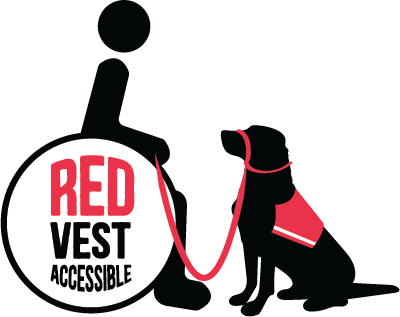Service Dog Rights, Access, and Laws
According to the Americans with Disabilities Act (ADA), people who are in the company of an Service Dog must have all the same rights and access of any other person. This includes entry into restaurants, shops and places where dogs are typically not allowed to go.
“The Americans with Disabilities Act (ADA) was passed in 1990 and gives civil rights protections to individuals with disabilities similar to those provided to individuals on the basis of race, color, sex, national origin, age and religion. It works to break down barriers to employment, transportation, public accommodations, public services and telecommunications for people with disabilities.”
The U.S. Department of Justice
Service Animals and Emotional Support Animals – Where are they allowed and under what conditions? is a guide that provides an overview of how major Federal civil rights laws govern the rights of a person requiring a service animal. These laws, as well as instructions on how to file a complaint, are listed in the last section of the publication. The guide also discusses service animals in a number of different settings as the rules and allowances related to access with service animals will vary according to the law applied and the setting.
Summary of the Americans with Disabilities Act
- Clients with their Service Dogs are protected by the federal law the Americans with Disabilities Act (ADA).
- The ADA guarantees that all people with disabilities have the legal right to use their assistance animal in all areas that are open to the general public.
- “No pet” policies do not apply to assistance animals, even in facilities that sell or prepare food.
- Assistance animals come in all breeds and sizes, and are not required to wear special identifying items when they work.
- Businesses may not ask a person to prove his or her disability and may not ask for proof that an assistance animal is certified.
- Assistance animals may only be removed from a public environment for excessive barking and/or disruptive behavior (this is highly unlikely to occur).
- In the event that a Service Dog team is located near someone with allergies and/or fear of animals, it is the responsibility of the owner or proprietor of the business to provide equal but seperate accommodations for both parties. It is the right of the Service Dog team to remain in place.
- Businesses may not charge an extra fee to disabled individuals that are accompanied by an assistance animal, and may not seat the person in a separate area from other patrons.
- Always ask a disabled individual before touching his or her assistance animal. Assistance animals are friendly, but any form of distraction could cause problems for the handler – even when the handler is seated.
For answers to many questions about Service Dogs and public access, please see this ADA publication: Frequently Asked Questions
about Service Animals and the ADA.
Service Dog Laws by State
Visit the Michigan State University website for a table comparing all 50 states’ service animal law, including service animal definitions, equal access laws, service dogs in training coverage, and service dog fraud laws
